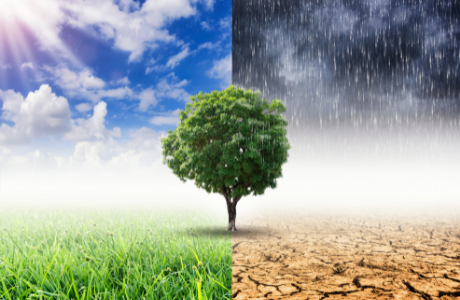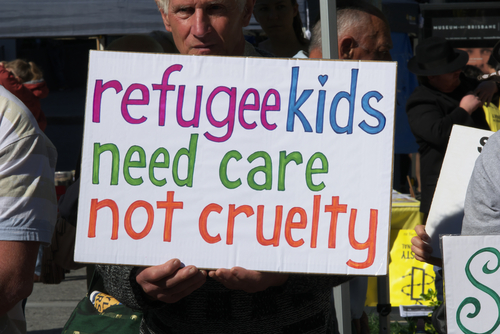When a significant issue becomes politicised, it creates polarisation. That is what has occurred with climate change. People hear those two words and view them through the filter of their political leanings. But what if we could take the heat out of global warming? The good news is we can, simply by understanding all the complexities of climate change through compassionate eyes.
Compassion: The Heart of God
Jesus emphasised compassion as the primary attribute of God’s nature. He said, “Be compassionate, just as your Father is compassionate” (Luke 6:36). In other words, this is what God is like, now imitate him.
Compassion comes from the Hebrew word for “womb” and means “to feel the feelings of others.” Compassion is “to feel the suffering of another deeply and be moved by that suffering to act.” So, let’s look at climate change through the eyes of compassion and take the heat out of global warming!
Compassion for the Planet
We live on a beautiful planet, and there is nowhere else to go (take a moment to process!). We need to look after and have compassion for the earth.
The first expression of human impact on earth’s climate was in 1896. A few decades later, amateur scientist Guy Stewart Callendar linked global warming to CO2 emissions. And here we are 75 years later, and governments are finally waking up to the impact humans have on the planet. It is not too late to act, but we are running out of time.
More evidence of this flashes across our screens every day. From unprecedented fires to unusual weather, extreme heat, to exceptional flooding. For example, a few weeks ago, the mercury soared to a record 49.7 degrees in the village of Lytton, Canada. The following day the town was destroyed by fire.
According to BBC News, the number of days reaching 50 degrees and more has doubled since 1980. Natural disasters are increasing. It’s been reported that “nearly 1 in 3 Americans live in a county hit by a weather disaster in the past three months.”
Compassion for the People
People are affected by climate change already, and that will only increase unless we act. Sadly, developing nations are the most affected. And developed countries are the biggest polluters because of our never-ending desire for more, but at what price?
Wealthy nations need compassion for developing countries and their people. “No man is an island, entire of itself; every man is a piece of the continent, a part of the main,” said John Donne in the seventeenth century. The English poet and Anglican cleric was correct. Humanity is intricately woven together. Compassion for one is compassion for all.
The impact of climate change on countries like Haiti displaces people and compels them to seek safety and welfare elsewhere. According to Time Magazine, Haiti is just one of many countries that will face the most severe consequences of climate change.
Unless we address the root causes, developed nations will be inundated with climate refugees. And it is the poorest people in developing countries that will be hardest hit and least able to get help. Compassion will compel us to act.
Compassion for Affected Communities
Any plan to address climate change must consider the communities that currently rely on coal, gas, and associated industries. We cannot blithely forge ahead with little or no regard for the people whose livelihood depends on these industries. While we stand with those suffering from the impacts of climate change, we also have compassion for people working in industries who stand to lose their occupations.
With pressure from investors and international agreements, many mining towns and regions have a limited lifespan. Coal is on the way out, and other cleaner sources of renewable energy are taking over. It’s reported that coal mining is amongst the most rapidly declining industries in the world.
Compassion will cause us to work closely with affected regions to ensure they don’t become ghost towns in the years to come. Rather than a “gas-led recovery” out of the pandemic, Australia’s government should direct post-COVID spending to renewables. “Stimulus programs backing clean energy as a path out of recession would create nearly three times as many jobs for every dollar spent on fossil fuel developments,” according to a financial consultancy analysis by Ernst & Young.
Right now, we are leaving people in these communities to an uncertain future. Compassion will not abandon them; it will work creatively with each community and plan for the future NOW!
Governments must consult with the affected communities, facilitate exit strategies from coal and gas, and support them in making the most of Australia’s exceptional natural advantages. To do less is to abandon them to an uncertain and dismal future. Together, they should determine the best plan for each community and develop specific goals. What industries and activities are best suited to each area? Wine, tourism, horse studs, solar, heat pumps, wind farms, and so on. Different locations will offer distinct opportunities.
To be compassionate towards these communities involved in the extraction, use, and export of coal and gas supports a fair, planned, and sustained transition to more diversified local economies. But unless the federal government acts to support renewable energy, the Australian economy will be left behind by competitors.
Compassion for Future Generations
What sort of world are we leaving for today’s youth? And what will the world be like in generations to come? A new study published by Forbes Magazine showed that “even moderate climate change” would lead “to cascading effects of accelerated sea level rise and species loss.” The world’s environment is carefully and intricately balanced. If we don’t rise to the challenge of climate change, the future looks bleak.
Does the greatest commandment, love your neighbour as yourself, only apply to people today? Or are we to love our future neighbours too? We cannot simply wash our hands of an unfolding human tragedy. In the name of the one who calls us to love one another, it is time Christians be part of this human struggle for the future of humanity.
In the lead up to the COP26 Climate Summit in Glasgow in November,
Bayside Church is encouraging people who feel passionate about this issue to contact their Federal MP. Click here for more information.







